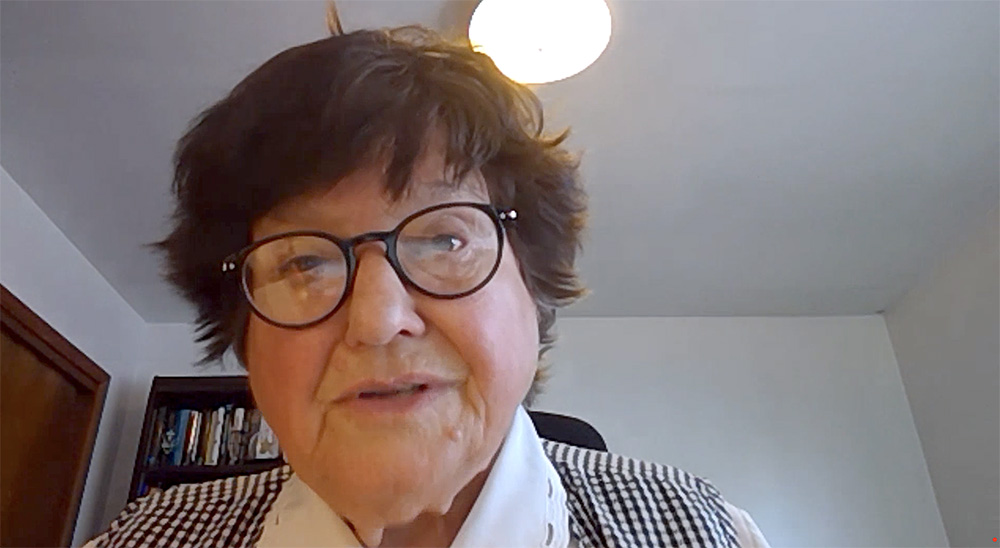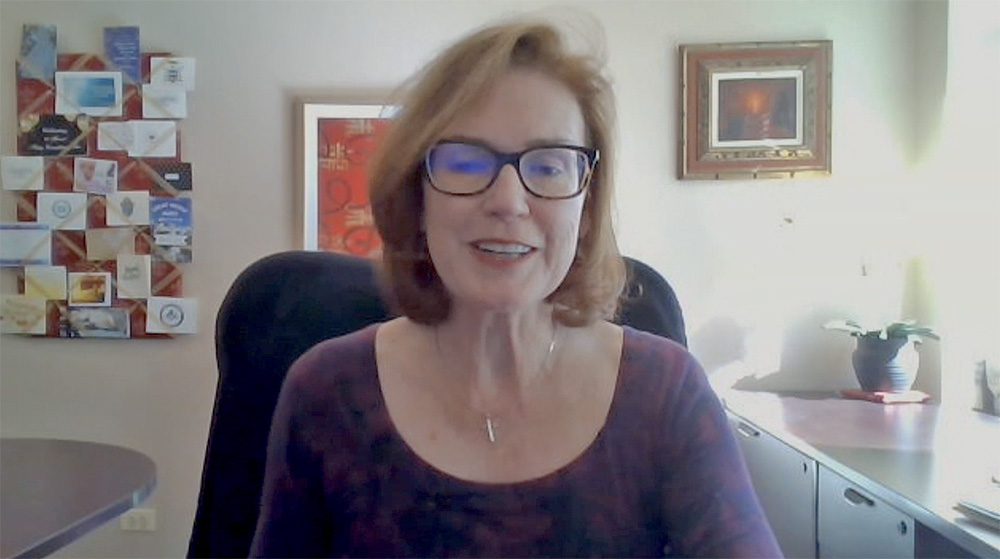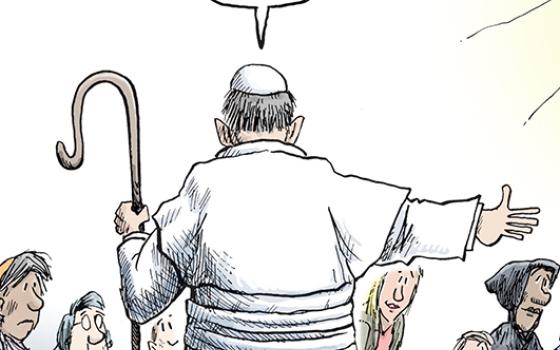
St. Joseph Sr. Helen Prejean gives the keynote address to the annual conference of the Resource Center for Religious Institutes on Oct. 26. (GSR screenshot)
Solving the world's problems, big and small, from global to personal, requires community, says Sr. Helen Prejean.
Prejean, a Sister of St. Joseph whose tireless advocacy against the death penalty was made famous in her book Dead Man Walking and the movie of the same name, gave the keynote address Oct. 26 to the Resource Center for Religious Institutes' annual conference. Prejean has spent more than six decades in ministry, with half of that devoted to a prominent campaign against the death penalty.
The center's annual conference, a gathering of religious and lay professionals attending workshops on topics such as changes in employment law and cybersecurity, was to be held in Orlando, Florida, but is being held virtually because of the coronavirus pandemic. The conference runs Oct. 26-28.
Prejean said she depends on her religious community to sustain her in her spiritual life and her ministry, and thanked them for supporting her all these years.
"I didn't expect this [ministry fighting the death penalty]. It's like falling down the laundry chute and ending up in, of all places, on death row," she said. "My whole community ... they were just as surprised as I was."
But whatever the problem, she said, no one can solve it alone.
"You can't make it without community as we work through the big issues of today," Prejean said.
Recognizing that we are part of a community requires us to help and defend those who are marginalized, whether they are people made poor, immigrants, or on death row. She is grateful the church finally has a stance on capital punishment that is consistent with its teaching: St. Pope John Paul II declared it was only permissible in very few instances, and Pope Francis later said it was never justified and called it a "grave" violation of human rights.
Advertisement
The death penalty is especially unacceptable in a community because it is used so unfairly, she said, noting that 98% of the people on death row are poor, and that prosecutors choose to seek capital punishment "overwhelmingly" only when the victims are white.
"It's status that determines what is the 'worst of the worst' " and deserving of the death penalty, she said, not justice. "It was never about justice."
The Catholic Church also needs to better recognize its obligations to all members of the community, she said, whether it is women — "I can speak before the United Nations ... but I cannot preach in my own church" — or LGBTQ people or racial minorities.
"Where people are marginalized, where people are disrespected, where people are treated like garbage and rejected, we've got to get in there" and help them, Prejean said. "Always our goal is the same: Our hearts are bent, as the moral arc of the universe is, toward justice."
Earlier in the day, attendees heard the latest guidance on workplace issues such as whether employers can require employees to get the COVID-19 vaccine and impose policies such as masks, testing and quarantines.
Attorney Colette Kopon also warned institutes that as fewer people are working remotely and as more are returning to the workplace, the number of sexual harassment and sexual misconduct cases is rising, so employers need to ensure they are vigilant, especially if they've let training lapse during the pandemic.
Attorney Michael Airdo warned that when people work remotely, there is less security, less oversight, and increased stress on the employees, "which is a recipe for increased malfeasance," he said. In addition, the number of data breaches is so high, the chances of an organization experiencing one is now one in four, Airdo said.

Consultant Mary Foley speaks Oct. 26 during a workshop on lessons learned during the COVID-19 pandemic. The workshop was part of the Resource Center for Religious Institutes' annual conference Oct. 26-28. (GSR screenshot)
In an afternoon session, consultant Mary Foley told participants they need to remember the implications of the pandemic "are profound and long-lasting," but they can make some of those effects positive ones.
For example, she said many religious communities during the extensive lockdowns made sure to personally reach out to friends and donors.
"So why not keep this up?" she asked. "Why not be the standard bearer for kindness?"
She also noted that maintaining those relationships is not necessarily about fundraising, but that needs to be kept in mind.
"One of the biggest mistakes made at the beginning of COVID was people stopped fundraising," Foley said. "Yes, it was appropriate to pause while we got our ducks in a row and figured out this wasn't going to be a two- to four-week experience ... but people's generosity stayed intact and, in fact, increased."
A workshop Oct. 27 will examine business interruption and income losses from the pandemic; an Oct. 28 session will address issues faced by contemplative orders implementing the new norms given in the instruction Cor Orans. The conference ends Oct. 28 with a Mass celebrated by Cardinal Joseph Tobin of Newark, New Jersey.






